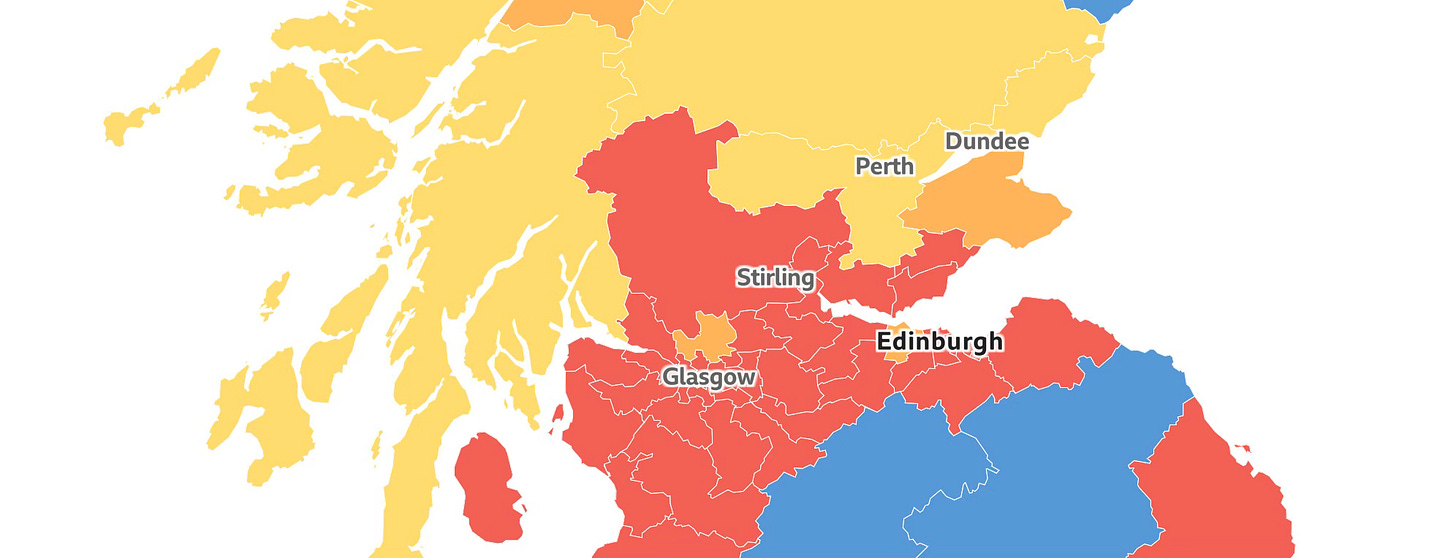The Return of the Tartan Tories
What does a disastrous election mean for the SNP?
The SNP’s defeat last week was so dramatic that few people have actually taken the time to fully analyse it.
The raw numbers are, of course, brutal for the nationalists. They lost 39 MPs and half a million votes. When the much-delayed final result was announced in Inverness, Skye and West Ross-shire, the SNP had just nine seats left and many of those - such as the two seats in Scotland’s Yes City, Dundee - were hanging by a thread.
Facing such an onslaught, it is unsurprising that the nationalists’ blame game is already in full flow. Joanna Cherry was among the first to attack new SNP leader John Swinney, noting that far from steadying the ship he had, in fact, sunk it.
Former SNP Cabinet Secretary Alex Neil agreed, and suggested Swinney - barely three months into the job - should make way for a Kate Forbes-Stephen Flynn double act.
The most damning attack (so far) came from the SNP’s former deputy leader, Jim Sillars, who suggested Nicola Sturgeon - who he dubbed “Stalin’s wee sister” - was also to blame. Sillars added:
“[The general election result] was inevitable given how the Sturgeon/Swinney era misled the movement, lost its common sense in government, promoted marginal issues as national priorities while the real priorities of the people such as education, housing, NHS, infrastructure, were notable only for the staggering level of incompetence with which they were dealt with.
“Whether the leadership has the grace to repent is of no matter. It is a busted flush. The people have no regard for them.”
These are the kind of recriminations that would make Scottish Labour at its nadir blush, although it is hard to disagree with Sillars’ essential point.
But amid all the internecine blood-letting, the nationalists have missed the most fundamental consequence of July 4: the return of the Tartan Tories.
This is most apparent from the electoral map. The SNP no longer hold any seats in the Central Belt. Indeed, you now have to travel north of the Tay before you can even hope to find the constituency office of an SNP MP.
This means not just SNP politicians, but also members and supporters, will be increasingly concentrated in rural Perthshire and the Highlands.
The MPs elected there will need to represent those voters, who tend to be more economically and socially conservative. Meanwhile, in more than half the Westminster seats the SNP now hold it is the Conservatives - not Labour - who are the closest rival.
While it is of course true that the SNP will continue to have devolved elected representatives in the urban, Central Belt (at least for the time being), their power is on the wane.
The leadership of Swinney and Forbes was already moving the SNP back towards the right, and such moves will only be accelerated by this rebalancing of the nationalist base after July 4.
Such a transition will doubtless be welcomed by tweed-wearing nationalists who enjoy singing folk songs about Robert the Bruce and are nostalgic for political campaigns claiming “It’s Scotland’s Oil”.
But it will do nothing to arrest the SNP’s decline. If anything, the return of the Tartan Tories will push the nationalists back into the electoral pigeon hole that they spent decades trying to climb out of, and will leave middle Scotland even more open for a continued Labour resurgence.
The election delivered a changing of the guard in Scotland in more ways than one, and I am delighted and deeply humbled to have been asked to take Notes on Nationalism forward after Blair McDougall’s election as the new Scottish Labour MP for East Renfrewshire.
There is no question that there is a high bar to meet. Blair is not only a brilliant thinker and devastating critic of populism, but also a wonderful writer with an incisive political instinct.
NoN’s loss is, however, East Renfrewshire’s gain, and I am pleased to say Blair will still occasionally contribute to these pages when he can.
In the meantime, my ambition is to continue to provide the insight and analysis readers of one of Scottish politics’ most popular newsletters have come to expect. In that respect, I am not planning any radical changes but - with devolved elections less than two years away and nationalism in turmoil - there should be plenty to write about.
Please do get in touch with ideas, comments, criticisms and suggestions at any time.
And, if you like what you see, please do consider sharing Notes on Nationalism with family, friends and colleagues by clicking here:
Finally, if you would like some further reading on Scottish politics, I wrote a piece for The Spectator this week arguing that Anas Sarwar is now the most powerful Labour figure outside the cabinet.
Thank you, and until next time…



